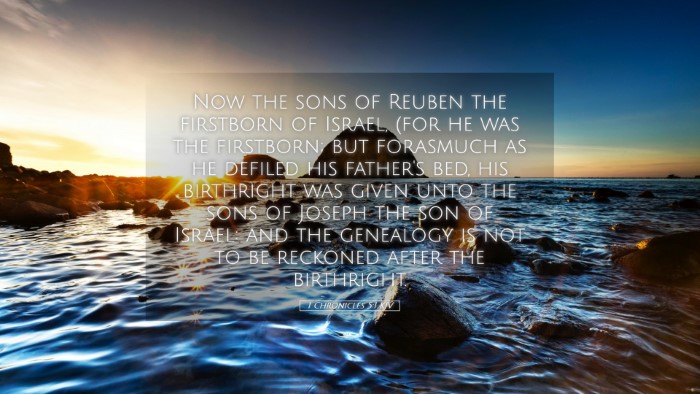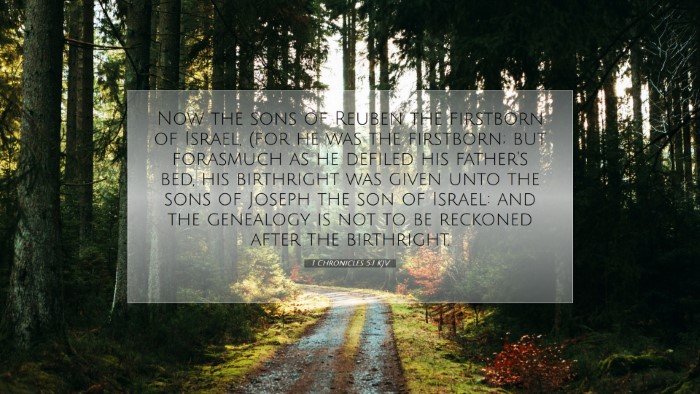Commentary on 1 Chronicles 5:1
1 Chronicles 5:1 reads: "Now the sons of Reuben the firstborn of Israel, for he was the firstborn; but, forasmuch as he defiled his father's bed, his birthright was given unto the sons of Joseph the son of Israel; and the genealogy is not to be reckoned after the birthright."
Introduction
This verse serves as an introduction to the genealogical record concerning the tribe of Reuben, setting the stage for the discussions surrounding the inheritance and lineage of the tribes of Israel. It also reflects upon the critical theme of birthright and how it is affected by moral behaviors and divine justice.
Exegesis of Key Terms
- Firstborn: The term 'firstborn' signifies privilege and responsibility. Reuben, as the firstborn of Jacob, had a special status among his brothers.
- Defiled his father’s bed: This refers to Reuben's inappropriate action with Bilhah, Jacob's concubine, illustrating the grave consequences of sin.
- Birthright: The birthright encompassed not only the inheritance of property but also spiritual leadership and status within the family, which Reuben forfeited due to his actions.
Theological Insights
This verse highlights the principle of divine retribution and the importance of moral integrity. The implications of Reuben's actions serve as a cautionary tale for leaders and families. The narrative demonstrates how personal choices can affect familial legacies, inheritance, and spiritual standing.
Insights from Commentators
Matthew Henry
Matthew Henry emphasizes the significance of family order and the implications of sin. He notes that Reuben's defilement not only cost him the birthright but also affected the entire tribe of Reuben. In his commentary, he underlines that God's judgment often aligns with moral conduct, as seen in the case of Reuben. Henry points out that despite Reuben's firstborn status, the transfer of birthright to Joseph reflects God's sovereignty in choosing leadership based on character rather than mere birth order.
Albert Barnes
Albert Barnes delves into the historical context of Reuben’s actions. He provides an analysis of how Reuben's sin brought disgrace upon himself and the tribe. Barnes notes that the "genealogy is not to be reckoned after the birthright" signifies a shift in leadership and privilege. He argues that this change is not merely punitive but is a part of God’s unfolding plan for Israel. The loss of birthright, he suggests, serves as a foundation for understanding the subsequent lineage of Joseph and the tribes' eventual roles in Israel's history.
Adam Clarke
Adam Clarke approaches the verse with a focus on the moral implications of Reuben's actions. He points out that while Reuben's status was significant, it was ultimately overshadowed by his wrongdoing. Clarke draws attention to the phrase "the genealogy is not to be reckoned after the birthright," illustrating the theme of divine election and the idea that God's choices are not contingent on human standards. Clarke also highlights the lessons learned from Reuben's failure, emphasizing moral integrity as critical for anyone in a position of influence.
Practical Applications
- Leaders’ Conduct: This passage serves as a reminder to church leaders and those in authority about the importance of personal integrity.
- Understanding Consequences: It illustrates that actions, especially those that contravene moral standards, carry significant consequences beyond the immediate context.
- Divine Sovereignty: The text encourages believers to recognize God’s sovereignty in human affairs, particularly regarding familial and spiritual leadership.
- Redemption and Grace: While Reuben lost the birthright, the overarching narrative of the Bible is one of redemption. This serves as a reminder that even in failure, God offers hope and restoration.
Conclusion
1 Chronicles 5:1 serves as a profound reminder of the intertwining of spiritual legacy and moral conduct. Through the lens of Reuben's story, observers are invited to reflect on how personal integrity, family dynamics, and God's sovereign choices shape the direction of lives and communities.


